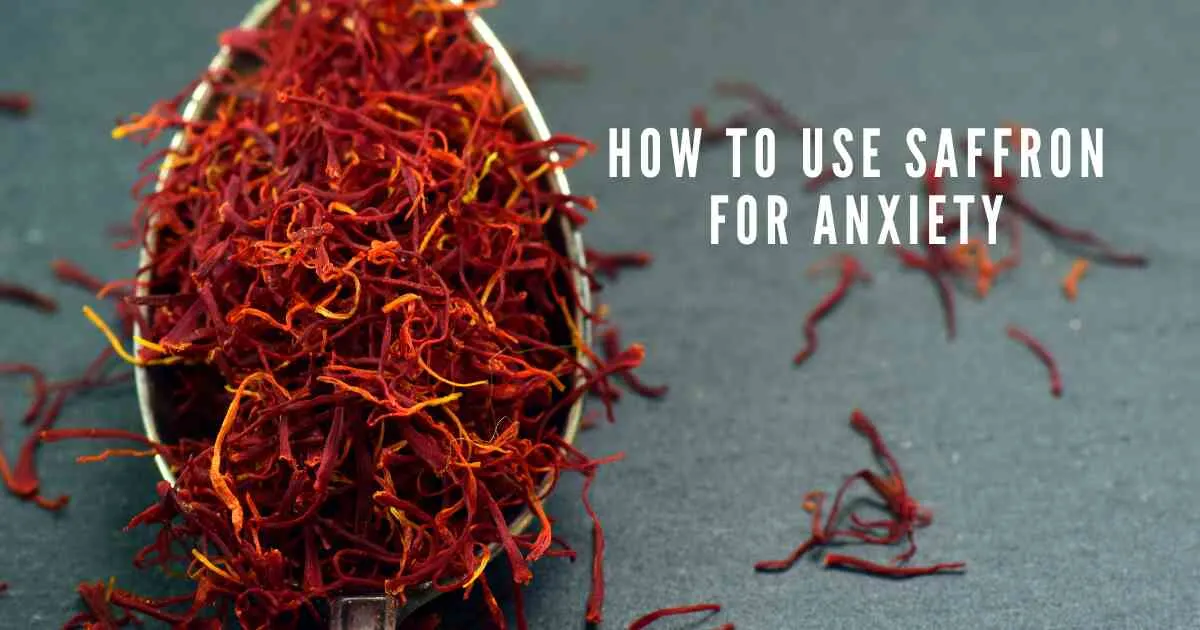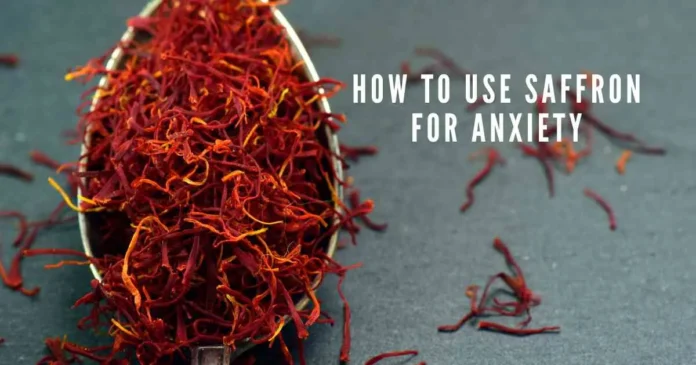How to Use Saffron for Anxiety a natural Remedy Worth Considering, In today’s fast-paced world, it is not uncommon to experience feelings of anxiety. Whether it’s caused by work, personal relationships, or other stressors, finding effective ways to manage anxiety is important for maintaining overall well-being. While there are many treatment options available, both pharmaceutical and natural, one ancient remedy that has gained attention in recent years is saffron.

Saffron, scientifically known as Crocus sativus, is a spice obtained from the saffron crocus flower. It has a long history of use in traditional medicine, especially in areas such as Iran, India, and Greece. In addition to its culinary applications, saffron has been revered for its potential health benefits, including the ability to reduce anxiety symptoms. So, how can you harness the power of saffron to reduce anxiety?
Here are some tips and methods to consider:
Saffron Tea:
The easiest way to consume saffron is to make it into tea. First of all, soak some threads of saffron in hot water for about 15 minutes. You can enhance the taste by adding a little honey or a slice of lemon to it. Enjoy a cup of saffron tea in the morning or before bed to calm your nerves and promote relaxation.
Saffron supplements:
If you prefer a more convenient option, saffron supplements are readily available in capsule or tablet form. When choosing a supplement, select a reputable brand that uses high-quality saffron extract. Follow the recommended dosage instructions provided on the product packaging, and consult a health care professional if you have any underlying medical conditions or are taking other medications.
Saffron-rich dishes:
Adding saffron to your diet is another delicious way to get its anxiety-relieving benefits. Whether you’re preparing savory dishes like paella, risotto, or soup or enjoying sweet treats like saffron-infused desserts, adding a pinch of this precious spice can enhance both the flavor and your mood.
Aromatherapy
Apart from consuming saffron, you can also experience its calming effects through aromatherapy. Invest in high-quality saffron essential oil and use it in a diffuser to fill your space with its soothing scent. Alternatively, you can dilute saffron oil with a carrier oil like coconut or almond oil and massage it onto your temples, wrists, or chest for instant relief.
Mindful Consumption:
No matter how you use saffron, practicing mindfulness can increase its effectiveness in managing anxiety. Take time to enjoy each sip of saffron tea or dish containing saffron, focusing on the present moment and allowing yourself to fully experience the sensory pleasure it brings.
While saffron holds promise as a natural remedy for anxiety, it’s important to remember that individual reactions may vary. It is always a good idea to approach any new treatment with caution and consult a health care professional, especially if you have existing health concerns or are pregnant or breastfeeding.
Health benefits of saffron
- Rich in antioxidants: Saffron contains compounds like crocin, crocetin, and safranal, which have antioxidant properties that help protect cells from damage caused by free radicals.
- Mood Enhancement: Saffron has been shown to have antidepressant properties, potentially improving mood and reducing symptoms of depression.
- May Aid in Weight Management: Some studies suggest that saffron may help suppress appetite and reduce cravings, which could aid in weight management efforts.
- Promotes Heart Health: Saffron may lower cholesterol levels and blood pressure, reducing the risk of heart disease and improving overall cardiovascular health.
- Anti-Inflammatory Effects: The active compounds in saffron possess anti-inflammatory properties, which may help reduce inflammation and alleviate symptoms of conditions like arthritis.
- Supports Cognitive Function: Research suggests that saffron may improve cognitive function and memory, making it beneficial for brain health and potentially reducing the risk of neurodegenerative diseases.
- May Improve Digestive Health: Saffron has been traditionally used to aid digestion and relieve digestive discomfort. It may help soothe the digestive tract and reduce the symptoms of conditions like bloating and gas.
- Enhances Immune Function: The Rich in Antioxidants: Saffron contains compounds like crocin, crocetin, and safranal, which have antioxidant properties that help protect cells from damage caused by free radicals.
- Mood Enhancement: Saffron has been shown to have antidepressant properties, potentially improving mood and reducing symptoms of depression.
- May Aid in Weight Management: Some studies suggest that saffron may help suppress appetite and reduce cravings, which could aid in weight management efforts.
Special Precautions and Warnings
- When taken by mouth, saffron is commonly consumed as a spice or color in food. As a medicine, saffron is possibly safe when taken in doses up to 100 mg daily for up to 26 weeks. Some typical side effects consist of feelings of drowsiness, gastrointestinal issues, and instances of nausea or vomiting. Allergic reactions are also possible. It is probably unsafe to take saffron by mouth in large amounts. High doses of 5 grams or more can cause toxicity. A dose of 12–20 grams can cause death.
- When applied to the skin: There is not enough reliable information to know if saffron is safe or what the side effects might be. Pregnancy: Saffron is commonly consumed as a spice or color in food. It is probably unsafe to consume saffron in amounts greater than those normally found in food. An excess amount of saffron can shrink the uterus and cause miscarriage.
- Breastfeeding: There is not enough reliable information to know if it is safe to use amounts of saffron greater than those found in food while breastfeeding. Stay safe and limit your food intake.
- Saffron’s Impact on Mood: Saffron has been observed to influence mood, particularly in individuals. It has the potential to induce agitation and impulsive behavior in those affected by this condition. If you have this condition, then do not use saffron.
- Allergy to Lolium, Olea (which contains olive), and Salsola plant species: People who are allergic to these plants may also be allergic to saffron.
- Surgery: Saffron slows down the central nervous system. Anesthesia and other drugs administered during surgery can also impact the central nervous system. Stop taking saffron at least two weeks before scheduled surgery.
Interaction:
- High blood pressure medications (antihypertensive medications) interact with saffron.
Saffron can reduce blood pressure. Taking saffron along with blood pressure-lowering medications may cause your blood pressure to drop too low. Monitor your blood pressure closely. - Caffeine interacts with saffron. Saffron can reduce the rate at which the body breaks down caffeine. Taking saffron with caffeine may increase the effects and side effects of caffeine in some people.
- Diabetes medications (antidiabetes medications) interact with saffron. Saffron can reduce blood sugar levels. Taking saffron along with diabetes medications may cause blood sugar to drop too low. Monitor your blood sugar closely.
- Sedative medications (CNS depressants) interact with saffron. Saffron may cause sleepiness and slow breathing. Some medications, called sedatives, can also cause drowsiness and slow breathing. Taking saffron along with sedative medications may cause breathing problems or excessive sleepiness.
Saffron for anxiety dosage
Conclusion:
Ultimately, adding saffron to your daily routine can be a simple yet effective way to reduce feelings of anxiety and promote overall well-being. Whether in the form of a relaxing cup of tea, a delicious addition to your meals, or a fragrant aroma in your home, saffron offers a holistic approach to managing stress and enhancing mental health. So why not try this golden spice and discover its transformative benefits for yourself
FAQ.
- How much saffron should I take for anxiety?
- The recommended dosage of saffron for anxiety is typically around 30 mg per day.
- What is the best way to take saffron?
- The best way to take saffron is by steeping a few threads in hot water to make saffron tea or by adding it to dishes as a spice.
- How do you take saffron as an antidepressant?
- To use saffron as an antidepressant, it’s typically taken as saffron extract in doses ranging from 15-30 mg per day.




